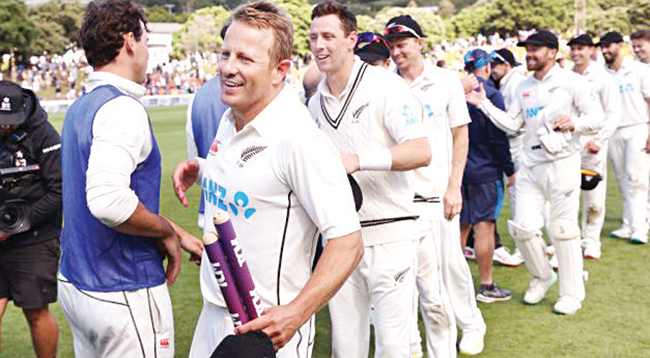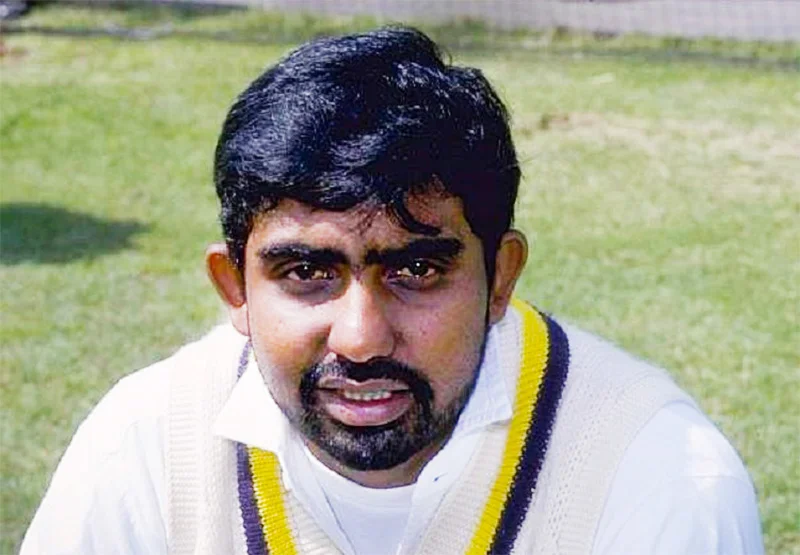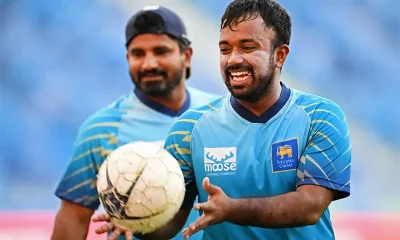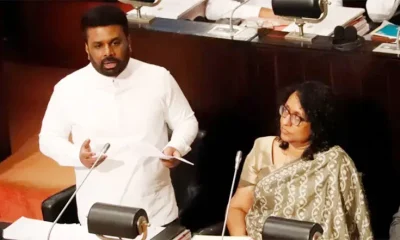Sports
New Zealand name same 13 who faced England for Sri Lanka Tests

There were no surprises in the 13 New Zealand named for their two-Test series against Sri Lanka that begins on March 9. All 13 players who featured in their recent 1-1 draw with England were named, with the omissions from that squad being the uncapped seamer Jacob Duffy, legspinner Ish Sodhi, and the injured Kyle Jamieson.
Tim Southee will lead the squad that is coming off the high of becoming only the fourth team to win after following on, in a dramatic game which they snatched by one run in Wellington to level the series against England. The batting will continue to be anchored by Kane Williamson, with Tom Latham, Henry Nicholls, Devon Conway, Daryl Mitchell and Will Young for support. Tom Blundell will continue behind the wicket, with Michael Bracewell the key in the spin department. Neil Wagner, fresh off his signature short-ball exploits against England, will spearhead the pacers along with Southee, the line-up including Matt Henry, Blair Tickner and Scott Kuggeleijn.
Jamieson, who was withdrawn from the squad initially named for that England series, is due to undergo back surgery for an injury that has kept him out of international cricket since June 2022. The out-of-contract Trent Boult, who’s focusing on playing franchise T20 cricket, continues to remain unselected.
The two Tests against Sri Lanka are part of the World Test Championship, and while defending champions New Zealand are out of contention for the final, Sri Lanka need to sweep the series 2-0 to have a shot at making the title bout. The first Test will be played in Christchurch, followed by the second in Wellington from March 17.
New Zealand Test squad to face Sri Lanka:
Tim Southee (capt), Tom Blundell (wk), Michael Bracewell, Devon Conway, Matt Henry, Tom Latham, Daryl Mitchell, Blair Tickner, Neil Wagner, Scott Kuggeleijn, Henry Nicholls, Kane Williamson, Will Young
Out:
Jacob Duffy, Ish Sodhi, Kyle Jamieson (withdrawn from previous series)
(Cricinfo)
Sports
Bihan, Mevindu shine on day one

Under 19 Cricket
A century by Bihan Gamage and and a six wicket haul by Mevindu Kumarasiri were the individual highlights on day one of the Under 19 Division I Tier ‘A’ and ‘B’ matches on Monday.
While Gamage’s century was the backbone of DS Senanayake’s challenging total of 365 runs against Nalanda, Mevindu Kumarasiri’s six wicket haul helped Sri Sumangala restrict Isipatana to 136 runs.
Later Sri Sumangala reached 158 for two wickets at stumps thanks to an unbroken third wicket stand of 140 runs between Sandeep Wijerathna (61n.o.) and Neksha Iddamalgoda (81n.o.).
That was not the only notable partnership of the day as the ninth wicket pair of Kaveesha Githmal (43) and Kavindu Nimsara (66) put on 99 runs for Mahinda to post 284 runs against Lumbini in their match.
At DSS ground
Scores
DSS 365 all out in 79 overs (Savain Kalansooriya 54, Bihan Gamage 102, Janindu Ranasinghe 50, Shevan Welgama 73; Osanda Pamuditha 2/69, Dunitha Anusara 4/66, Sahas Godage 3/76)
Nalanda 28 for 1 in 10 overs
At Galle
Scores
Mahinda 284 all out in 72.2 overs (Dulsith Darshana 63, Randula Mabarana 28, Manitha Rajapaksha 23, Kaveesha Githmal 43, Kavindu Nimsara 66; Yashod Kavindu 5/100, Dinal Sewmina 2/32)
Lumbini 76 for 4 in 20 overs (Kisandu Dulneth 33, Yashod Kavindu 26; Sadev Nethmina 2/27)
At Panadura
Scores
Isipatana 136 all out in 47.2 overs (Yuveen Keshan 21, Dasith Senal 31; Mevindu Kumarasiri 6/54)
Sri Sumangala 158 for 2 in 45 overs
(Sandeep Wijerathna 61n.o., Neksha Iddamalgoda 81n.o.) (RF)
Latest News
Mandhana, Shafali and Ghosh help India edge run-fest to go 4-0 up

After three one-sided, low-scoring encounters, the fourth T20I between India and Sri Lanka exploded into a run-fest in Thiruvananthapuram, with both sides posting their highest totals in women’s T20Is. India’s big score of 221 for 2 proved too much for Sri Lanka, who fell short by 30 runs, handing the hosts a 4-0 series lead with one match remaining. India missed two catching opportunities and a stumping chance, while Sri Lanka gave away three, but the batting dominance was decisive.
Smriti Mandhana and Shafali Verma set the tone with blistering half-centuries to power India’s innings, while Chamari Athapaththu kept Sri Lanka in the chase with a fighting 52. Despite a few late cameo efforts, the visitors couldn’t overcome India’s dominant batting display.
Shafali and Mandhana delivered a masterclass in aggressive opening batting, putting together 162 runs off just 92 balls – the highest opening partnership for India in women’s T20Is. Shafali continued her purple patch with a third successive T20I half-century, while Mandhana, who had managed only 40 runs in the first three matches, roared back to form. The innings also saw Mandhana climb to the top of the charts for most runs (1,703) in women’s internationals in a calendar year, underlining her dominance.
India’s openers were relentless from the outset, racing to 61 without loss in the powerplay with 12 boundaries. Shafali’s innings was built on control and placement – her first six came only after her fifty, a loft over long-off in the 11th over – and she finished with 12 fours and a six.
Mandhana, meanwhile, struck 11 fours and three sixes, though her innings briefly dipped in tempo. After racing to 24 off 14 balls, she moved to 28 off 24 during a short lull before accelerating sharply to reach her half-century off 35 deliveries. From there, she cut loose, using the feet to loft the spinners and driving straight with authority.
The contest decisively tilted in overs 11 to 13, when India tore into the attack. The 11th over went for 15 runs, followed by a 20-run 12th and an 18-run 13th, each featuring two fours and a six. Any hopes Sri Lanka had of restricting the damage vanished as India surged from 85 for no loss to 120 in just two overs.
India brought up 150 in only 14.2 overs, making light of the Sri Lanka captain’s assessment at the toss that 140 would be a competitive total.
Sri Lanka had to wait 92 balls for their first breakthrough and struck again in the following over, the 17th, but any momentum was swiftly snuffed out by Richa Ghosh. With Harleen Deol replacing Jemimah Rodrigues, who was recovering from a mild fever, India promoted Ghosh to No. 3 for the death overs – a move that paid rich dividends. Having faced just one delivery in the series before this match, Ghosh made an impact, blasting 40 off 16 balls and adding an unbroken 53-run stand with Harmanpreet Kaur.
Ghosh announced herself by heaving her second ball over Nimasha Meepage’s head for four. After a relatively quiet 17th over, she found her range against the same bowler, striking two more boundaries. The onslaught peaked against Kavisha Dilhari, one of Sri Lanka’s more experienced bowlers, as Ghosh went into overdrive. She smoked three sixes and a four to plunder 23 runs from the 19th over, punishing anything in her hitting arc and underlining India’s ruthless finish.
Sri Lanka began their chase aggressively, with Hasini Perera taking charge. She tore into Renuka Singh’s first over, hitting three boundaries, while Arundhati Reddy, making a comeback in place of the rested Kranti Gaud, conceded 17 off the second over. By the end of four, Sri Lanka had raced to 52 for 0, with the opening stand between Perera and Athapaththu putting on 59 runs off 34 balls.
Athapaththu struck the chase’s first six, charging down the track and clearing long-off off Deepti Sharma in the third over. Both left-handers punished anything too full or short, though Perera fell in the sixth over, holing out to Harmanpreet at mid-off off Reddy’s offcutter.
Athapaththu kept the momentum going, adding 57 runs off 46 balls with Imesha Dulani for the second wicket. Athapaththu moved from 20 off 15 balls to fifty in the next 19 deliveries, hitting three sixes and as many fours. However, her innings ended when she mistimed a charge over the off side, gifting a catch to Mandhana at long-off off Vaishnavi Sharma. At that stage, Sri Lanka needed 106 runs from 42 balls. Despite a few late cameos, the chase fell short.
On a night dominated by big scores, Vaishnavi emerged as the standout bowler, picking up two crucial wickets for just 24 runs. Introduced into the attack after the powerplay, she began by floating the ball outside off stump to entice the batters before gradually attacking the stumps and testing the left-handers with clever variations.
After dismissing Athapaththu in the 13th over, she also removed Harshitha Samarawickrama for a 13-ball 20 in the 17th, when the batter looked threatening. Her disciplined lines and sharp changes of pace helped India keep Sri Lanka’s scoring in check.
Brief scores:
India Women 221 for 2 in 20 overs (Smriti Mandhana 80, Shafali Verma 79, Richa Ghosh 40*, Harmanpreet Kaur16*; Malsha Shehani 1-32, Nimasha Meepage 1-40) beat Sri Lanka Women 191 for 6 in 20 overs (Chamari Athapaththu 52, Hasini Perera 33, Imesha Dulani 29, Harshitha Samarawickrama 20, Kavisha Dilhari 13, Nilakshika de Silva 23*; Arundhati Reddy 2-42, Vaishnavi Sharma 2-24, Shree Charani 1-46) by 30 runs
(Cricinfo)
Sports
Gurusinha’s Boxing Day hundred celebrated in Melbourne

A private function will be held on Monday, December 29 at Melbourne’s Spicy Wicket Restaurant to celebrate Asanka Gurusinha’s iconic Boxing Day century at the MCG, the first and still the only hundred by a Sri Lankan at the grand old ground that staged the game’s inaugural Test and has long been cricket’s festive showpiece in Australia.
Sri Lanka featured in the 1995 Boxing Day Test against Australia at the Melbourne Cricket Ground, a match remembered as much for controversy as for courage. Umpire Darrel Hair repeatedly no-balled Muttiah Muralitharan for throwing in front of a stunned crowd of 55,000, turning the contest into a cauldron.
It was a one-sided affair dominated by Mark Taylor’s Australians. Forced to follow on, Sri Lanka were staring down the barrel before Gurusinha dug in to produce a back-to-the-wall 143. It was the left-hander’s career-best Test score and more importantly helped Sri Lanka avoid the ignominy of an innings defeat.
“Any Test hundred is a moment to remember, but to do it against Australia, facing McDermott, McGrath, Warne and Reifel at the MCG is very special,” Gurusinha told Telecom Asia Sport. “It didn’t sink in 30 years ago, but I know now why it’s special. I always enjoyed batting on pitches with bounce and seam and Australia was a place I loved playing.”
“Coming up against the best team in the world at the time and that formidable bowling attack is something that will stay with me forever,” he added.
Gurusinha also paid tribute to those behind the celebration. “I want to thank my good friends David and Cathy Cruse for organising this event. All my family will be there and it’s great to have Aravinda de Silva as chief guest. I played against him at school level for eight years and then alongside him for 12 years for Sri Lanka. He’s a dear friend.”
Gurusinha made his Test debut in 1985, straight out of school as a 19-year-old wicketkeeper-batter. His sound technique soon demanded promotion and he settled into the No. 3 slot, becoming the side’s human sandbag, valuing his wicket, batting time and wearing down attacks during marathon vigils that tested bowlers’ patience as much as their stamina.
A key member of Sri Lanka’s World Cup-winning squad in 1996, Gurusinha willingly shelved his natural strokeplay to play the anchor’s role, allowing the likes of Sanath Jayasuriya and Aravinda de Silva to cut loose. He struck a vital half-century in the final against Australia, earning praise from captain Arjuna Ranatunga, who famously labelled him the unsung hero of Sri Lanka’s World Cup triumph.
Gurusinha retired prematurely at the age of 30 soon after that World Cup success, migrated to Australia and has since made Melbourne his adopted home, fitting, perhaps, that the city where he played his finest innings will now raise a glass to a knock that has aged like fine wine.
-

 News5 days ago
News5 days agoBritish MP calls on Foreign Secretary to expand sanction package against ‘Sri Lankan war criminals’
-

 Sports5 days ago
Sports5 days agoChief selector’s remarks disappointing says Mickey Arthur
-

 News4 days ago
News4 days agoStreet vendors banned from Kandy City
-

 News6 days ago
News6 days agoSri Lanka’s coastline faces unfolding catastrophe: Expert
-

 Opinion5 days ago
Opinion5 days agoDisasters do not destroy nations; the refusal to change does
-

 News4 days ago
News4 days agoLankan aircrew fly daring UN Medevac in hostile conditions in Africa
-

 Sports6 days ago
Sports6 days agoLife after the armband for Asalanka
-

 Midweek Review6 days ago
Midweek Review6 days agoYear ends with the NPP govt. on the back foot













